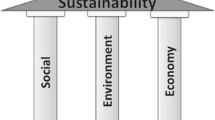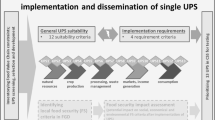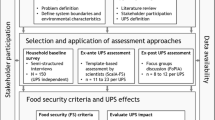Abstract
Subsistence farmers in sub-Saharan Africa aim for strategies to enhance their food security. Implementing upgrading strategies (UPS) must be assessed prior to and during implementation. The objective of this paper was to analyze and compare ex-ante and mid-term assessments of two food-securing UPS (rainwater harvesting and micro fertilization, improved cooking stoves) conducted with local stakeholders from four rural villages in Tanzania. We utilized locally developed food security criteria developed under the Framework of Participatory Impact Assessment (FoPIA). Focus group discussions were used to anticipate (ex-ante) and reflect (mid-term evaluation) the likely effects of selected UPS. Overall, the stakeholders’ assessment scores declined from the ex-ante to the mid-term assessment; in particular, the economic criteria decreased, followed by the social criteria. Four critical factors were identified: 1) rainfall-related problems; 2) workload; 3) managerial performance; and 4) social conflicts. Assessment differences were found within the villages, between regions and across villages. Combining both the assessment scores and the farmers’ explanations during assessments provides the key to optimizing the food-securing potential of UPS.

Similar content being viewed by others
References
Abdulai A, CroleRees A (2001) Determinants of income diversification amongst rural households in southern Mali. Food Policy 26:437–452
Agol, D., Latawiec, A. E., & Strassburg, B. B. N. (2014). Evaluating impacts of development and conservation projects using sustainability indicators: opportunities and challenges. Environ Impact Assess Rev, 48(0), 1–9. doi: https://doi.org/10.1016/j.eiar.2014.04.001
Barrett CB (2008) Smallholder market participation: concepts and evidence from eastern and southern Africa. Food Policy 33:299–317
Barrientos-Fuentes JC, Berg E (2013) Impact assessment of agricultural innovations a review. Agronomía Colombiana 31:120–130
Bell, S., & Morse, S. (2008). Sustainability indicators: measuring the immeasurable? (Vol. 2). London: Earthscan
Benson T, Kirama SL, Selejio O (2011) The supply of inorganic fertilizers to smallholder farmers in Tanzania. Mimeo, Alliance for a Green Revolution in Africa, Nairobi, Kenya
Boafo YA, Saito O, Kato S, Kamiyama C, Takeuchi K, Nakahara M (2016) The role of traditional ecological knowledge in ecosystem services management: the case of four rural communities in northern Ghana. Int J Biodiversity Sc, Ecosystem Ser Manag 12:24–38
Bond A, Morrison-Saunders A, Pope J (2012) Sustainability assessment: the state of the art. Impact Assessment Project Appr 30:53–62
Bryan E, Deressa TT, Gbetibouo GA, Ringler C (2009) Adaptation to climate change in Ethiopia and South Africa: options and constraints. Environ Sci Pol 12:413–426
Carletto C, Zezza A, Banerjee R (2013) Towards better measurement of household food security: harmonizing indicators and the role of household surveys. Global Food Security 2(1):30–40
Chianu JN, Chianu JN, Mairura F (2012) Mineral fertilizers in the farming systems of sub-Saharan Africa. A review Agronomy for Sustainable Development 32:545–566
Cosyns H, Damme PV, Wulf RD (2013) Who views what? Impact assessment through the eyes of farmers, development organization staff and researchers. Int J Sust Dev World 20(4):287–301. https://doi.org/10.1080/13504509.2013.806372
Croppenstedt A, Goldstein M, Rosas N (2013) Gender and agriculture: inefficiencies, segregation, and low productivity traps. The World Bank Research Observer 28:79–109
De Weerdt J (2010) Moving out of poverty in Tanzania: evidence from Kagera. J Dev Stud 46:331–349
Ezezika OC, Deadman J, Daar AS (2013) She came, she saw, she sowed: re-negotiating gender-responsive priorities for effective development of agricultural biotechnology in sub-Saharan Africa. J Agric Environ Ethics 26:461–471
FAO (2011) Women and agriculture. Closing the gender gap for development. Food and Agriculture Organization of the United Nations, Rome
FAO (2013) Contract farming for inclusive market access. Food and Agriculture Organization of the United Nations, Rome
FAO, IFAD, And WFP. 2015. The state of food insecurity in the world 2015. The 2015 International Hunger Targets Meeting. Taking Stock of Uneven Progress. Rome: Food and Agriculture Organization of the United Nations
Foley JA, Defries R, Asner GP, Barford C, Bonan G, Carpenter SR, Chapin FS, Coe MT, Daily GC, Gibbs HK, Helkowski JH, Holloway T, Howard EA, Kucharik CJ, Monfreda C, Patz JA, Prentice IC, Ramankutty N, Snyder PK (2005) Global consequences of land use. Science 309:570–574
Gandure S, Walker S, Botha JJ (2013) Farmers' perceptions of adaptation to climate change and water stress in a south African rural community. Environmental Development 5:39–53
Graef F, Sieber S, Mutabazi K, Asch F, Biesalski HK, Bitegeko J, Bokelmann W, Bruentrup M, Dietrich O, Elly N, Fasse A, Germer JU, Grote U, Herrmann L, Herrmann R, Hoffmann H, Kahimba FC, Kaufmann B, Kersebaum KC, Kilembe C, Kimaro A, Kinabo J, König B, König H, Lana M, Levy C, Lyimo-Macha J, Makoko B, Mazoko G, Mbaga SH, Mbogoro W, Milling H, Mtambo K, Mueller J, Mueller C, Mueller K, Nkonja E, Reif C, Ringler C, Ruvuga S, Schaefer M, Sikira A, Silayo V, Stahr K, Swai E, Tumbo S, Uckert G (2014) Framework for participatory food security research in rural food value chains. Global Food Security 3:8–15
Graef F, Uckert G, Schindler J, König HJ, Mbwana HA, Fasse A, Mwinuka L, Mahoo H, Kaburire LN, Saidia P, Yustas YM, Silayo V, Makoko B, Kissoly L, Lambert C, Kimaro A, Sieber S, Hoffmann H, Kahimba FC, Mutabazi KD (2017) Expert-based ex-ante assessments of potential social, ecological, and economic impacts of upgrading strategies for improving food security in rural Tanzania using the ScalA-FS approach. Food Security 9:1255–1270
Hunter LM, Strife S, Twine W (2010) Environmental perceptions of rural south African residents: the complex nature of environmental concern. Soc Nat Resour 23:525–541
Isakson SR (2014) Food and finance: the financial transformation of agro-food supply chains. J Peasant Stud 41:749–775
Kelley T, Ryan J, Gregersen H (2008) Enhancing ex post impact assessment of agricultural research: the CGIAR experience. Research Evaluation 17:201–212
König HJ, Schuler J, Suarma U, McNeill D, Imbernon J, Damayanti F, Dalimunthe SA, Uthes S, Sartohadi J, Helming K, Morris J (2010) Assessing the impact of land use policy on urban-rural sustainability using the FoPIA approach in Yogyakarta, Indonesia. Sustainability 2:1991–2009
König HJ, Sghaier M, Schuler J, Abdeladhim M, Helming K, Tonneau J-P, Ounalli N, Imbernon J, Morris J, Wiggering H (2012) Participatory impact assessment of soil and water conservation scenarios in Oum Zessar watershed, Tunisia. Environ Manag 50:153–165
König HJ, Uthes S, Schuler J, Zhen L, Purushothaman S, Suarma U, Sghaier M, Makokha S, Helming K, Sieber S, Chen L, Brouwer F, Morris J, Wiggering H (2013) Regional impact assessment of land use scenarios in developing countries using the FoPIA approach: findings from five case studies. J Environ Manag 127:S56–S64
König HJ, Graef F, Schindler J, Fasse A, Mutabazi KD, Lambert C, Ngwenya P, Uckert G, Mahoo H, Hattermann FF, Sieber S (2017) Combining participatory, qualitative and quantitative methods for impact assessment of food value chains into an integrated framework. Food Sec 9(6):1309–1321
Lev, L., and G. W. Stevenson. 2010. Acting collectively to develop midscale food value chains in the U. S. Madison, WI USA: Center for Integrated Agricultural Systems
Lilja N, Dixon J (2007) Responding to the challenges of impact assessment of participatory research and gender analysis. Exp Agric 44:3–19
López-Ridaura S, Van Keulen H, Van Ittersum MK, Leffelaar PA (2005) Multiscale methodological framework to derive criteria and indicators for sustainability evaluation of peasant natural resource management systems. Environ Dev Sustain 7(1):51–69
Markelova H, Mwangi E (2010) Collective action for smallholder market access: evidence and implications for Africa. Rev Policy Res 27:621–640
Millstone E, Van Zwanenberg P, Marshall F (2010) Monitoring and evaluating agricultural science and technology projects: theories, practices and problems. IDS Bull 41:75–87
Morris J, Tassone V, de Groot R, Camilleri M, Moncada S (2011) A framework for participatory impact assessment: involving stakeholders in European policy making, a case study of land use change in Malta. Ecol Soc 16:12
Nyende P (2011) Building networks for market access. Lessons learned from the rural knowledge network (RKN) pilot project for East Africa (Uganda, Kenya and Tanzania). Food and Agriculture Organization of the United Nations, Rome
Reed MS (2008) Stakeholder participation for environmental management: a literature review. Biol Conserv 141:2417–2431
Schindler J, Graef F, König HJ (2015) Methods to assess farming sustainability in developing countries. A review Agronomy for Sustainable Development 35:1043–1057
Schindler J, Graef F, König HJ, McHau D, Saidia P, Sieber S (2016) Sustainability impact assessment to improve food security of smallholders in Tanzania. Environ Impact Assess Rev 60:52–63
Schindler J, Graef F, König HJ, Mchau D (2017) Developing community-based food security criteria in rural Tanzania. Food Security 9:1285–1298
Shiferaw B, Hellin J, Muricho G (2011) Improving market access and agricultural productivity growth in Africa: what role for producer organizations and collective action institutions? Food Security 3:475–489
Thomas, A. L. 2004. Civic agriculture. Reconnecting farm, food, and community. Medford, Massachusetts: Tufts University press; Hanover, London : University Press of new England
USAID (2008) Preliminary rural livelihood zoning: Tanzania. A special report by the famine early warning system network (fews net). Dar es Salaam, Tanzania
Woldenhanna T, Oskam A (2001) Income diversification and entry barriers: evidence from the Tigray region of northern Ethiopia. Food Policy 26:351–365
Ziervogel G, Ericksen PJ (2010) Adapting to climate change to sustain food security. Wiley Interdiscip Rev Clim Chang 1:525–540
Acknowledgements
This publication is a product of the Trans-SEC project (www.trans-sec.org) and was funded by the German Federal Ministry of Education and Research (BMBF) and the German Federal Ministry for Economic Cooperation and Development (BMZ). The views expressed are solely those of the authors and may not, under any circumstances, be regarded as stating an official position of the BMBF or BMZ. We thank Ms. Elena Magenau for her support in the statistical analysis.
Author information
Authors and Affiliations
Corresponding author
Additional information
Publisher’s Note
Springer Nature remains neutral with regard to jurisdictional claims in published maps and institutional affiliations.
Rights and permissions
About this article
Cite this article
Hernandez, L.E.A., Graef, F. & König, H.J. Participatory Impact Assessment of Food Securing Upgrading Strategies in Rural Tanzania. Syst Pract Action Res 32, 687–706 (2019). https://doi.org/10.1007/s11213-019-09481-0
Published:
Issue Date:
DOI: https://doi.org/10.1007/s11213-019-09481-0




